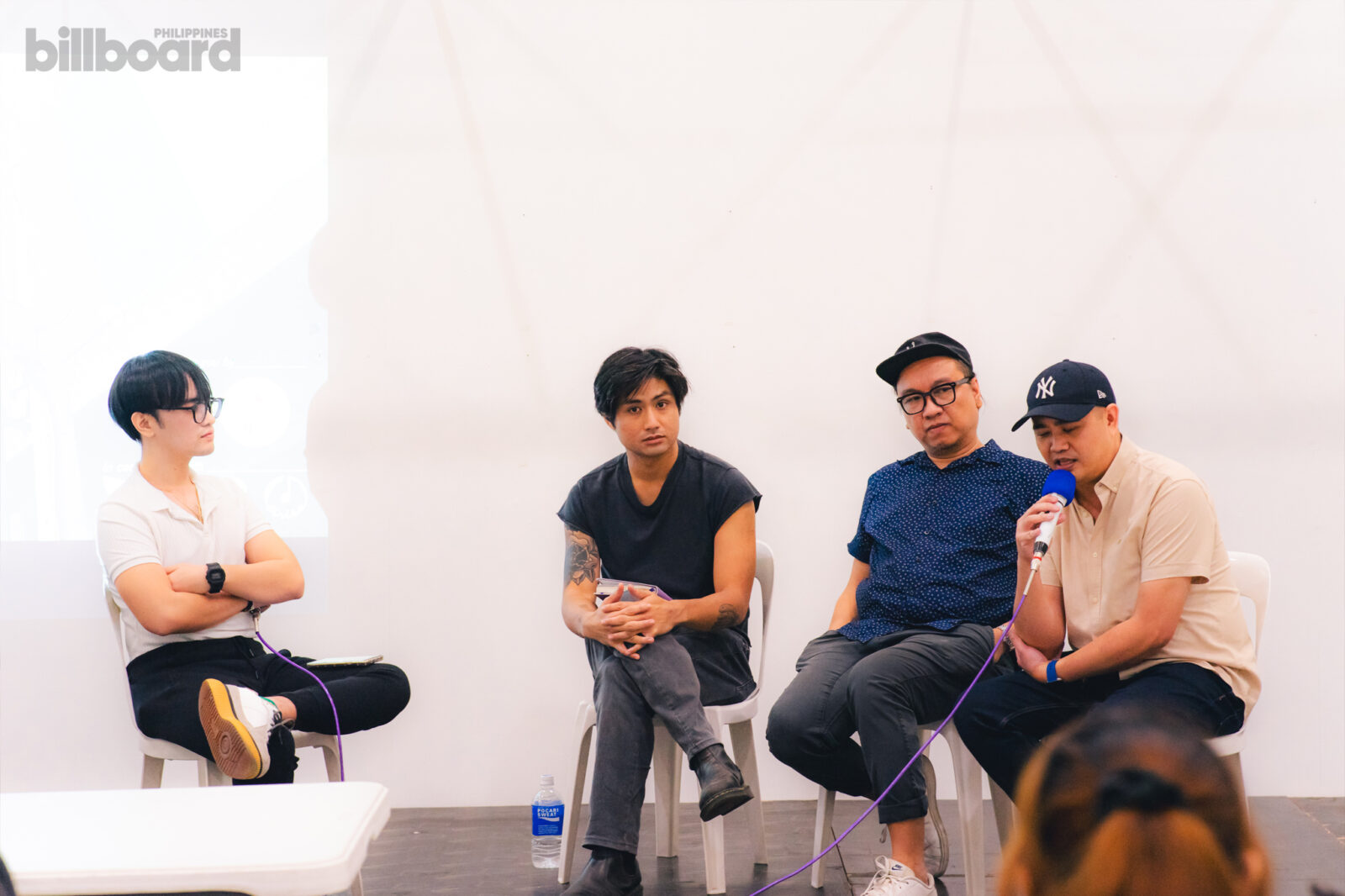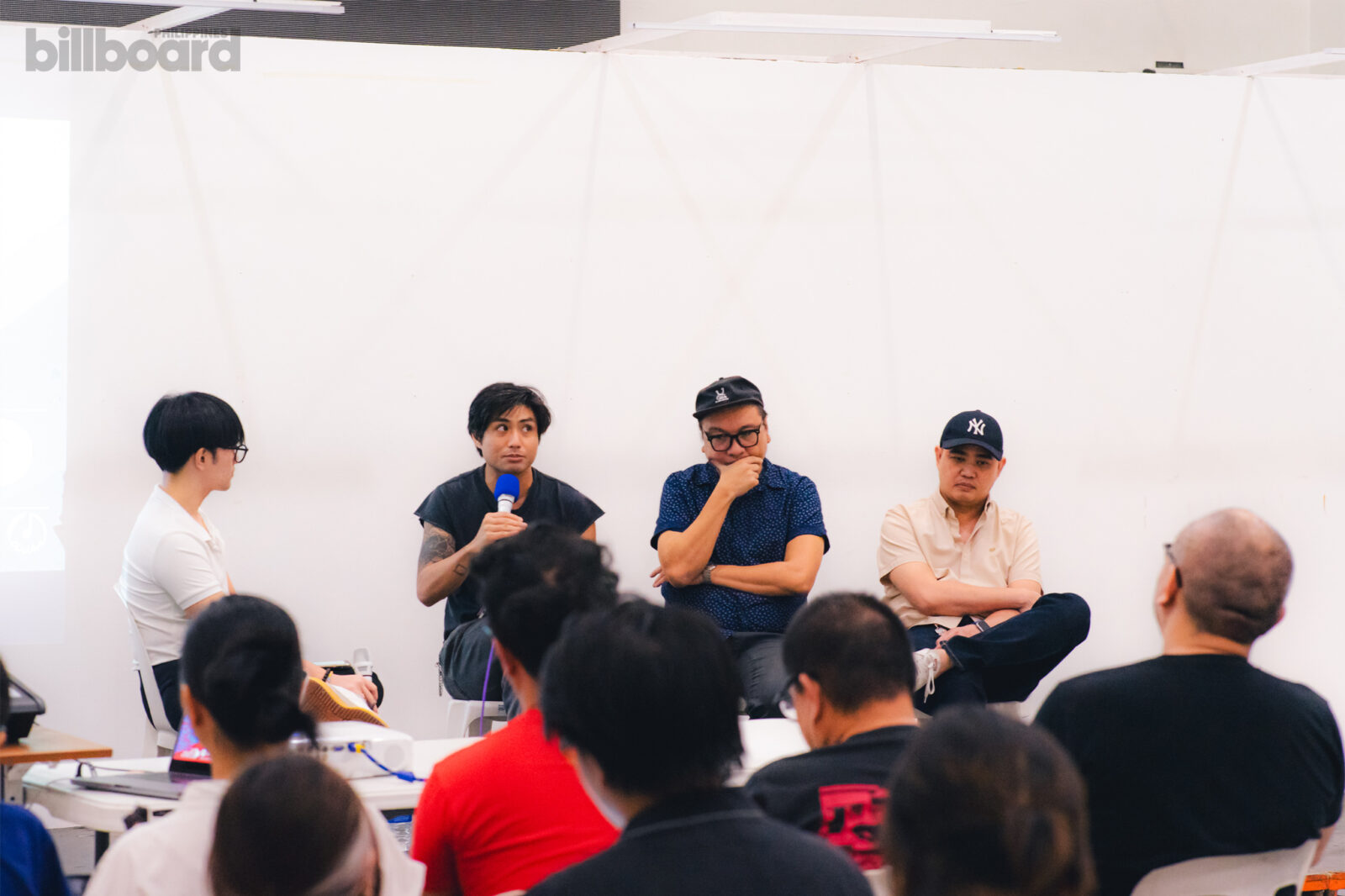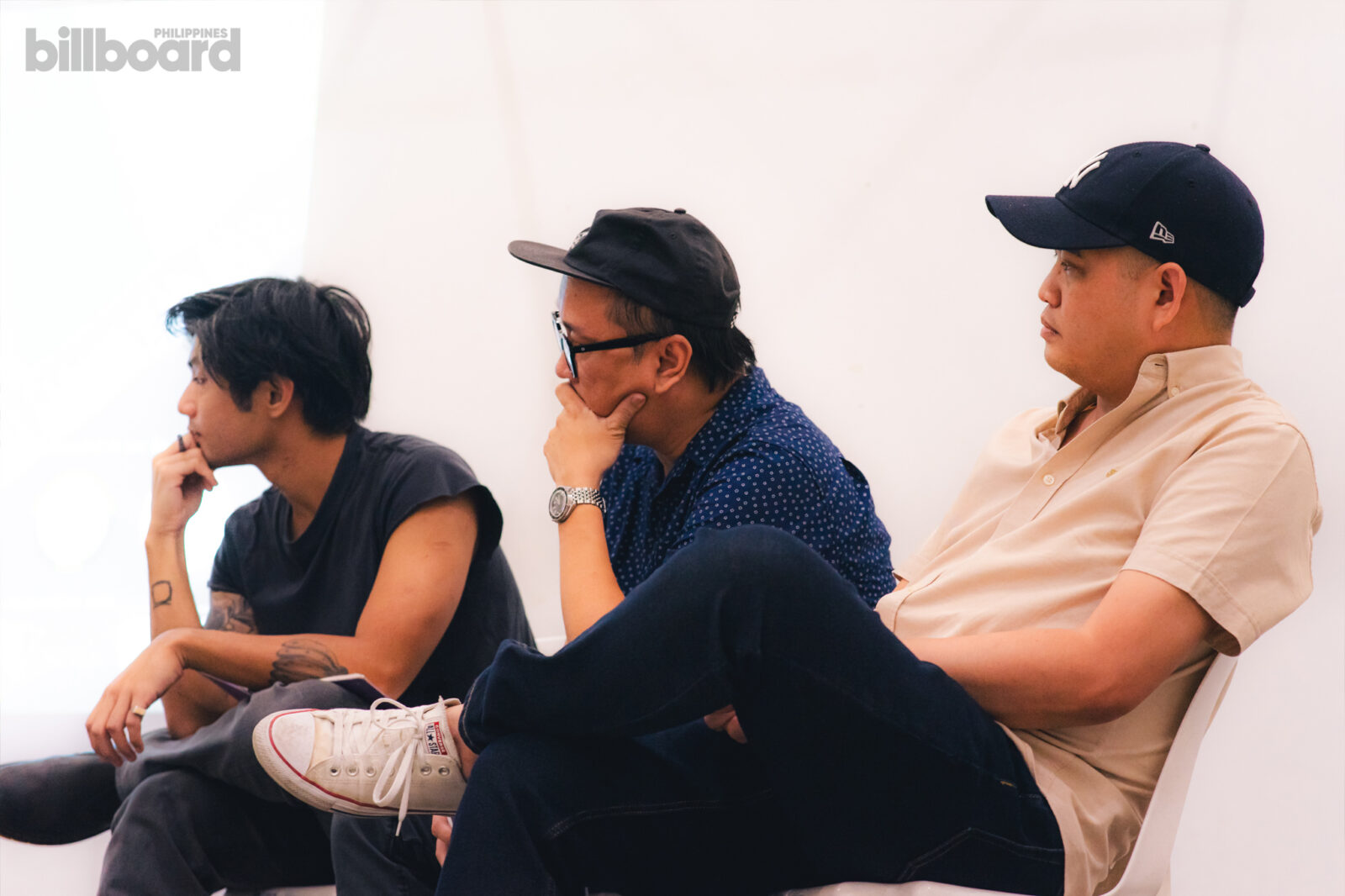Music Journalism 101: How To Actually Write About Music, As Told by Jason Caballa, Jam Pascual, And Aldus Santos
Here’s what it means (and takes) to be a music journalist in the present.

Jam Pascual, Aldus Santos, and Jason Caballa. Photographed by Easel Manes/Billboard Philippines.
Jam Pascual, Aldus Santos, and Jason Caballa. Photographed by Easel Manes/Billboard Philippines.
How exactly does one go about being a music journalist? What does it actually mean to write about music?
In a time where information is easily both consumed and disseminated with just a few clicks and taps, writing about our favorite artists and their music has never been easier. But as much as almost anyone can do it nowadays, whether professionally or just for fun, it can also be a daunting task that comes with a lot of responsibility and evolving know-how’s.
Last April 13, MusiKatip let curious minds gain insight into the world of music journalism through the experiences shared by three of its seasoned Filipino veterans: Jason Caballa, Aldus Santos, and Jam Pascual. These three writers were part of the one-day event featuring talks from professionals from various fields across the Filipino music industry, organized as a joint project by the Ateneo Musicians’ Pool and the UP Music Circle.
The following is a crash course provided by the three on what it actually means to write about music, providing experience-based knowledge gained from their decades-long careers as writers that still hold true in the current landscape of music journalism.

Photographed by Easel Manes/Billboard Philippines.
On who or what to write about
“It really depends where you operate,” said Santos, stating how, with him being a freelance music journalist, he either gets commissions from publications or personally does pitches on topics he cares about or finds interesting. Either way, the actual challenge, he states, is what exactly to say about each topic at hand, providing a chance for the writer to offer something new to the table.
Santos cautions, however, that given his and the other panelists’ positions as, coincidentally, practitioners of and within music as well (Santos with The Purplechickens and Pamphleteer, Caballa with Pedicab and Cheats, and Pascual with Imelda), there can be quite a number of points of compromise that one needs to consider carefully. This is inevitable if one is part of and is friends with people within the music community.
“We have friends whose music we don’t like. And they know,” added Caballa with a chuckle. “We have tastes as well [but] we won’t hate someone just because we don’t like their music,” he states before adding, “They know [that] we’re trying to inform people through our jobs.”
“There’s genuine insight and criticism to be found in these connections. But make sure you’re not insulated,” added Pascual, emphasizing how these genuine connections shouldn’t be completely disregarded as sources of insight into one’s writing. They would also state further the importance of not limiting oneself and therefore, making sure there is diversity in our coverage.
Adding to this, Caballa stressed the importance of timeliness in deciding what to write about. “You can always write about something you feel strongly about, but consider timeliness and relevance,” he stated. “There should be a timely reason.”

Photographed by Easel Manes/Billboard Philippines.
On standing out
When it comes to being different from the herd, there are a few things to consider.
One of these is the kind of piece you’re writing. Knowing the difference between a feature and a news article is crucial as the approach to the two can be vastly different. Caballa emphasized how writing styles differ between these two types of pieces, stating how an “overtly creative” style is less common with news pieces — a commonality more often found in features and magazine articles.
On the challenge of relevance, Pascual emphasized the undeniable importance of paying attention to trends when it comes to informing the kind of pieces one writes. “Take into consideration the current media landscape,” stated Pascual.
Adding to this, Caballa, who serves as the Music Editor for Billboard Philippines, also shared a few tips when working as a music journalist for a publication that both does digital and print. “Keep your content grounded and know the right time to post, your keywords, and the trends,” he stated while highlighting the importance of imparting insights that “get people thinking.”
For Santos, overall, finding the right angle is what makes your pieces, proclaiming it as “king” above anything else. He went on to state that offering something somewhat new is essential because without it, one is just simply “adding to the noise.”
Pascual cautioned, however, that when it comes to the pursuit of making our pieces stand out, we might get caught up in the thinking that if our ideas are more original, then they’ll get more attention. This is, sadly, not always the case. Therefore, Pascual emphasized that “to keep our sanity as music journalists,” it is important for one to not get too caught up by challenges stemming from the chase of standing out. “Chill the f**k out and don’t be paralyzed. Art and originality will win in the end but it just takes patience.”

Photographed by Easel Manes/Billboard Philippines.
On maintaining credibility and surviving in the current media landscape
Information being easily dished out by almost anyone these days has become an all-too-real situation that has grown to threaten the survivability of actual, credible news sources. With regards to this, Santos offered a small general history lesson on the work of music journalists in the past and how it has come to evolve in the present.
Santos shared that, before, what a music journalist writes “informs a purchase decision.” Back then, pieces of information on our favorite artists, their music, their announcements, and such were not readily available to anyone. The information traveled way longer than it does now. People actually had to look for and actively buy media to learn all about the latest news on music, or hear new releases.
However, with the advent of the internet and such, music journalists are no longer the so-called gatekeepers they were back in the day. They are no longer the sole curators of information on our favorite bands and all. Most especially in the present, everything is now available to anyone with artists and their labels now doing all the material teasing themselves and all. “What’s left for us to work on is the other things,” stated Santos. This meant the likes of “talking about the creative process,” “focusing on genre shifts,” or, of course, “breaking the news.”
“Everyone is a ‘journalist’ now,” stated Caballa, imparting a couple of know-how’s needed in order for the music journalist to survive in such a landscape. “Appreciate different styles and forms and do not simply just word vomit,” he stated. “Make sure to think of the reader. There’s always a trap in showing [your readers] how much you know. At the end of the day, ano man message mo (whatever your message is), make sure it’s readable.” He would then go on to emphasize how important it is to actually appreciate writing as an artform before adding, “Just read, appreciate lots of music, and develop your own style.”
“It all comes down to doing the right thing and giving a sh*t,” added Pascual. “We underestimate how many forms music journalism can take,” they state, noting that the practice goes beyond simply doing the likes of interviews, features, and reviews. “Music criticism, today and has always been, criticizing the oppressive system,” Pascual further stated, emphasizing that it is crucial for music journalists to also “sharpen the insights” on those types of conversations, issues, and happenings — an act that can change opinions for the better.

Photographed by Easel Manes/Billboard Philippines.
On handling hate and criticism
“Learn when to care and not care,” Caballa succinctly put. “Also, I don’t care what people think,” he adds. “But I don’t criticize just for the sake of hating. You need a valid reason [to] explain yourself well enough. Just because it clashes with your personal sensibilities does not mean it’s automatically bad. You have to back it up.”
Caballa would then add the importance of being able to write compellingly to the point where you can defend all your reasons such as why exactly you like or don’t like something. This can even be done, he shared, through simple statements along the lines of “it could’ve been like this because…” or “it would’ve worked better if…”
“Writing should primarily be a thinking exercise before setting down words to paper,” added Santos, emphasizing how important it is to “consume” with respect — the foundation of all criticism. This is most especially important when doing tasks such as reviewing music wherein Santos states how one should give the music respect enough to “consume it seriously.”
With this, Pascual stated that one always needs to come from a “principled place” as a music journalist, stressing the importance of how being sure of yourself and your work serves as a great way to counteract any hatred launched at you thanks to your craft.

Photographed by Easel Manes/Billboard Philippines.
On gushing and the need to draw the line as a fan in order to keep journalistic integrity
Given the nature of their work, music journalists are bound, one way or another, to eventually write about their favorite artists. As such, there arises the concern of journalistic integrity possibly being shaken by the mere fact that the fan inside just can’t be contained. But how big of a concern is it?
“Sometimes, it cannot be helped. You don’t necessarily have to stop yourself from gushing,” stated Pascual, elaborating that one’s liking for a certain artist or piece of work shouldn’t hinder them from actually expressing it. “What am I to say? That it’s ‘not good’?” However, he added that this should still be done while separating one’s commitment as a fan and as a critic.
“It can’t be helped and shouldn’t be helped,” agreed Santos.“ Just do it as well as you keep listening. Support it with good thinking that informs your writing. It is the foundation of it.”
To this, Caballa added that there is an “acceptable level of gushing” in writing, further stating that, “If you can translate that into writing, contextualize, and make an actual piece out of it, it works.” Alternatively, Caballa said that the gushing can also be left to other avenues, such as one’s own social media, because sometimes, at the end of the day, one can’t help but gush.

Photographed by Easel Manes/Billboard Philippines.
On rediscovering lost passion
“It happens. It really happens. It’s hard to churn out articles,” confessed Caballa. “But it’s good to have something you look forward to writing after the grind.” He would also advise taking breaks such as watching funny, nonsensical videos and just keep listening to music.
For Santos, reading a lot helps and actually seeing articles that make him go “I wish I’d written that” often greatly motivates and inspires him.
Much like what Caballa said, Santos agreed that having a story to look forward to writing after all the pieces one simply has to go through due to the nature of their work can actually be a great source of motivation. He would further add that just simply going through the routine of writing can help, stating that, much like any other practice, it eventually becomes muscle memory.
“It’s not your fault if you lose passion,” added Pascual. “It happens. Don’t blame yourself.”
When asked on what topics they want to write about next, Santos stated he personally aims to continue writing about topics outside of his comfort zone, harkening back to a time when he had to do reviews for “three angry rap records.” Caballa highlighted the importance of this, stating how it helps music journalists become “more exposed to stuff” they’re “not familiar with.” This included him, whose main genre isn’t exactly hip-hop, and his own recent case of having to interview and write about Davao-based hip-hop group PLAYERTWO.
Caballa also stated he is personally looking forward to writing about a lot more “exciting” up-and-coming acts, emphasizing that, alongside the duty of a publication like Billboard Philippines to cover the mainstream, they will still find ways to champion the underground in the Philippines.
Pascual capped off the question by leaving a challenge to every budding and aspiring writer present at the event. “Tell us what matters to you, your connections, [and] what you’re passionate about,” they said in closing. “You tell us. Because this room is full of promising voices.”
